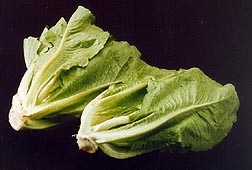This page has been archived and is being provided for reference purposes only. The page is no longer being updated, and therefore, links on the page may be invalid.
| New Romaine Lettuces Resist Dieback DiseaseBy Marcia WoodApril 10, 2003 It's the crisp, crunchy romaine lettuce that makes a Caesar salad so appealing. Romaine lettuce is also perfect for adding to other mixed greens. And what better natural, edible utensil for scooping up a creamy dip than the small, firm inner leaves of this lettuce? But today's commercially grown romaine is vulnerable to what's known as lettuce dieback disease. The disorder, which can easily devastate entire fields of this popular lettuce, is caused by one or more soil-dwelling Tombusviridae viruses. These include lettuce necrotic stunt virus, and tomato bushy stunt virus. Lettuce dieback disease doesn't afflict crisphead--also known as iceberg--lettuce or certain leaf lettuces. Two Agricultural Research Service plant geneticists have now bred what are apparently the first parent romaine lettuces that are resistant to these pernicious plant viruses. Edward J. Ryder and colleague Rebecca C. Grube developed the three novel lettuces, known as 01-778M, 01-781M and 01-789M, at the agency's U.S. Agricultural Research Station in Salinas, Calif. These lettuces result from about three years of research and testing in both infested and disease-free fields at Salinas and two other coastal California sites. The scientists noted that the lettuces have not yet been tested in other regions of California or Arizona where romaine lettuce is grown. Small supplies of the seeds of the new lettuces are available to plant researchers and breeders. Ryder and Grube will discuss their research today with visitors at the research station's daylong Open House. Other Salinas scientists from ARS, the University of California at Davis, and the Artichoke Research Association also will describe their experiments for the guests. ARS is the U.S. Department of Agriculture's chief scientific research agency. |

